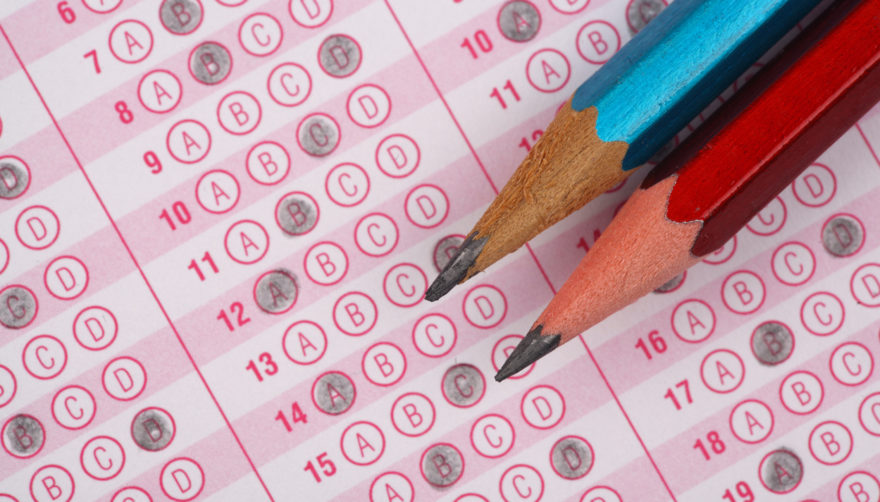- Blog
- > Ivy League Admissions
Which Ivies Are Test-Optional? (Updated for 2025)
- Dr. Rachel Rubin
- | January 31, 2025

When the pandemic began, nearly all colleges and universities in the United States dropped their standardized testing requirements when it became impossible for students in much of the country to find a test center and testing date reliably. Then, as the pandemic continued, many colleges extended their policies for another year or longer. Initially, however, it seemed like the Ivy League was eager to return to requiring test scores.
Then, in December 2021, Harvard University shook the testing and college admissions world by declaring that it would not require applicants to submit SAT or ACT scores through the next four years. Meanwhile, a few other Ivy League schools (including Cornell University and Stanford University) had already extended their test-optional policies through at least the Class of 2024. Now that it’s 2025, however, some Ivies are continuing to honor their test-optional policies while most are returning to requiring standardized tests.

What Prompted This Change?
Well, for one thing, the number of applications to top colleges shot up once the testing requirement disappeared. Given that universities are always eager to increase their selectivity, this skyrocketing interest was a boon to schools like Harvard and Yale, where acceptance rates had plateaued or even ticked up prior to the pandemic. By removing the SAT or ACT requirement, these top colleges managed to lower their already-low acceptance rates to 4% or even 3%.
Meanwhile, college admissions offices were paying more attention to equity than ever before and had begun to take claims against standardized testing increasingly seriously, especially evidence suggesting that these tests are unfair to low-income, minority, and other historically marginalized students. Their argument was: if we could successfully evaluate students without the test, why not do so?

The Majority of Ivy League Colleges Initially Followed Harvard’s Lead
It’s important to remember that reports of the SAT’s impending demise have oft been overstated; when the University of Chicago dropped its SAT or ACT requirement back in 2018, many thought similarly selective schools would immediately follow suit. The same line of thought arose when the University of California announced its test-blind pilot starting with the Class of 2021.
Furthermore, the College Board announced changes to the SAT that make the test fairer, more equitable, and more accessible. Whether these developments change colleges’ calculations about the test remains to be seen.
Columbia University implemented a permanent test-optional policy, the first Ivy League school to do so. They cite their commitment to diversity and their holistic evaluation of applicants as reasons for this decision.
On the other hand, the Massachusetts Institute of Technology moved in the opposite direction, announcing that it would require standardized test scores once again. The rationale is that recent changes to the SAT have made standardized testing more widely accessible than ever.
In the wake of that MIT decision, several Ivy League institutions have announced their own plans to return to requiring tests. In fact, only Princeton, Penn, and Columbia remain test-optional for future applicants, and of those, only Columbia has a permanent test-optional policy in place.

Understanding Test-Optional Policies
“Test-optional” means applicants can choose whether to submit standardized test scores, such as the SAT or ACT, as part of their application. Submitting these scores can bolster the application of students with strong scores. However, for those who feel their test scores do not reflect their academic abilities, opting out can shift the focus to other strengths, like GPA, extracurricular activities, and essays.
Some schools have also adopted “test-blind” policies for certain programs or applicants, meaning test scores are not considered even if submitted. This distinction is critical as you plan your application strategy.
Test-Optional Ivy League Schools in 2025
Here’s an overview of the test-optional policies for Ivy League colleges in 2025:
- Harvard University: Returning to requiring standardized tests for all future application cycles.
- Yale University: Implementing a new test-flexible policy, which means that candidates must submit test scores, but they choose from the ACT, SAT, AP exams, or IB exams.
- Princeton University: Test-optional for the 2025 admissions cycle; encourages applicants to showcase their strengths.
- University of Pennsylvania: Applicants may choose not to submit SAT or ACT scores for the 2025 admissions cycle; other elements, like GPA and activities, carry significant weight.
- Columbia University: Test-optional policy remains, ostensibly permanently; applicants without scores are evaluated equally.
- Dartmouth College: Restored its standardized testing requirements for all applicants.
- Brown University: Once again, requires the SAT or ACT in order to be considered for their incoming freshman classes.
- Cornell University: Reinstituting standardized testing requirements moving forward.
As you can see, the entire Ivy League was test-optional for a stretch of time in the wake of the pandemic, but now the majority of Ivy League institutions have abandoned those policies and returned to requiring test scores of all applicants. What remains to be seen is whether this trend will start to extend to less competitive, highly-ranked institutions as well and whether Princeton and Penn will also shift gears or will follow in Columbia’s footsteps instead.
Should You Submit Test Scores?
Your decision regarding whether or not to submit your SAT or ACT test scores to a test-optional school can significantly impact your application. If your scores are above the 50th percentile for the Ivy League colleges you’re applying to, submitting them could strengthen your case.
A score of 1540+ on the SAT or 35+ on the ACT is typically competitive for most Ivy League schools. If your scores fall below the average, it may be better to focus on other aspects of your application, such as your GPA, challenging coursework, and personal statement. Use your standardized test scores to your advantage when applying to test-optional colleges. If your test scores are impressive, submit them.
How to Build a Strong Test-Optional Application
If you decide not to submit test scores, focus on other components to make your application shine:
- Strong Academic Record: A high GPA and rigorous courses, such as those offered through AP or IB programs, demonstrate readiness for Ivy League academics–as evidenced by their presence in Yale’s new test-flexible policy.
- Compelling Personal Statement: Use this essay to highlight your personality, achievements, and goals. Specific anecdotes and clear writing make a lasting impression.
- Impressive Extracurriculars: Focus on quality over quantity. Leadership roles and activities aligned with your intended major stand out.
- Excellent Recommendation Letters: Choose recommenders who can provide detailed insights into your strengths and potential.
Test-optional colleges want to see potential in the students applying, whether or not they require test scores. If you submit an application that illustrates your unique strengths and capabilities, your application will stand out with or without SAT or ACT scores.
Navigating Ivy League Test-Optional Policies
The test-optional policies adopted by Ivy League schools provide flexibility, but they also place greater emphasis on other aspects of your application. Whether or not you submit test scores, ensure every part of your application reflects your academic achievements, personal strengths, and potential. With thoughtful planning, you can create a compelling application tailored to the evolving admissions process.
Ultimately, SAT or ACT scores are just one part of the college admissions process, and Spark Admissions can help you leverage your strengths when applying to colleges, whether or not they’re test-optional. We are here to help you thrive, no matter the number on your score report.


